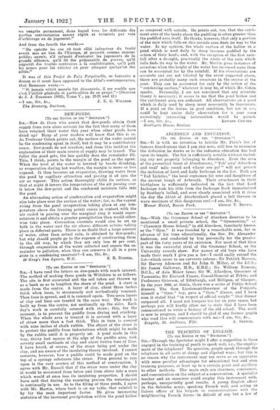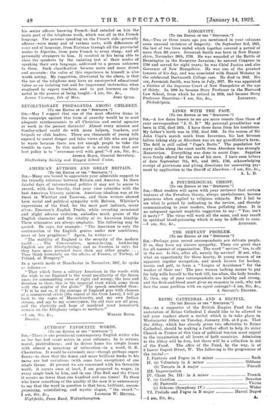THE TEACHING OF ENGLISH.
[TO THE EDITOR OF THE " SPECTATOR."]
Sia,—Through the Spectator might I offer a suggestion to those engaged in the training of youth to speak well, i.e., the employ- ment of the telephone? No question, people speak through the telephone in all sorts of slangy and slipshod ways; but this is no reason why the instrument may not serve as an apparatus with some peculiar advantages for educational test and even training purposes, at least up to a certain point and ancillary to other methods. The main ends are clearness, conciseness. and concentration on the subject of a conversation. A specialist teacher and an examiner could employ this instrument with, perhaps, unexpectedly good results. A young English officer in the Salonika army, speaking French well, and acting as liaison officer of his brigade in communications with the neighbouring French forces—in default of any but a few of
his senior officers knowing French—had entailed on him the main part of the telephone work, which was all in the French language. The persons speaking on the French side—generally officers—were many and of various sorts, with differences of voice and of language, from Parisian through all the provincial modes to Algerine, from pure French to army slang; and all personally strangers to him. It resulted in his being able to class the speakers by the isolating test 0: their modes of speaking their own language, addressed to a person unknown to them. Such classification became more and more direct and accurate: the value of this experience to himself is also worth noting. My suggestioa; illustrated by the above, is that the use of the telephone may have an unsuspected educational value as an isolating test and for impersonal instruction when employed by expert teachers, and to put learners on their metal in the process of being taught.—I am, Sir, &c.,
Lonon Vicarage, Isle of Man. JOHN QUINE.



































 Previous page
Previous page